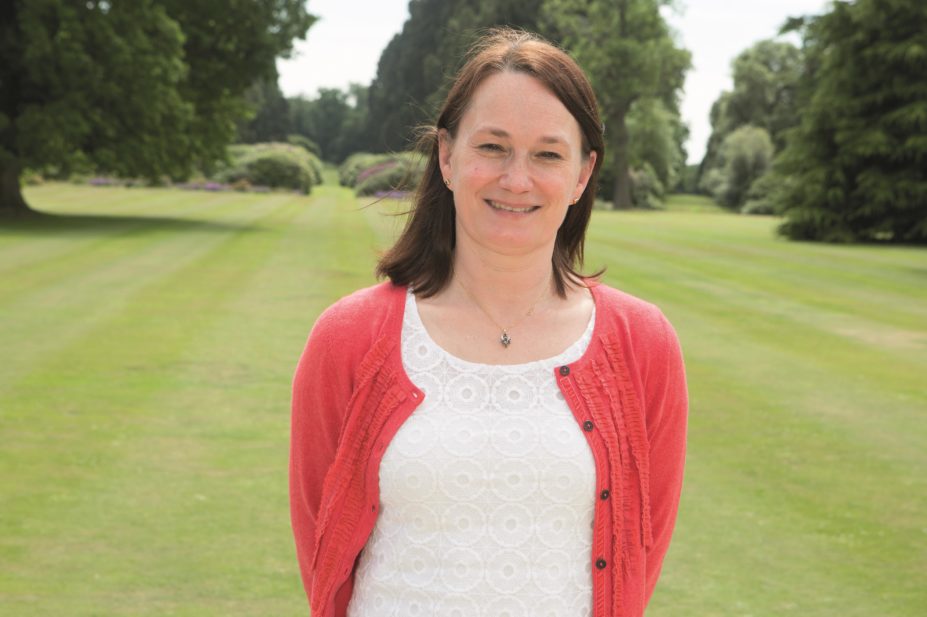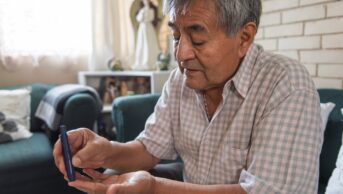
Elizabeth Hackett
Elizabeth Hackett, principal pharmacist for diabetes at University Hospitals of Leicester NHS Trust, is the only pharmacist to have been selected as one of 29 Diabetes UK clinical champions. The group comprises mostly diabetes consultants and GPs with a special interest in diabetes, but also includes diabetes specialist nurses, podiatrists, a dietician and a diabetes network manager. Hackett explains what she aims to achieve in the role and how it differs from her day job.
Why did you apply to be a champion for Diabetes UK?
I applied to become a champion for Diabetes UK because I believe that pharmacists can play a bigger role in the delivery of healthcare to people with diabetes. Many healthcare professionals find diabetes care difficult and, with so many insulins and new medicines available for managing diabetes, there is often a lot of confusion. Data from the 2013 National Diabetes Inpatient Audit (NaDIA) show that 37% of the prescription charts reviewed had at least one medication error. These data are better than that of previous years but there is still huge potential for improvement.
Many community pharmacists have regular contact with people who collect their medicines to manage diabetes. With the appropriate training and input, community pharmacists will be able to offer support to patients and their GPs.
What do you aim to achieve in the role?
I want to work closely with local pharmacists. For pharmacists in secondary care, I plan to deliver training with additional support and develop a checklist for them to run through when reviewing and counselling a patient with diabetes. I hope to be able to demonstrate that this brings about fewer errors with diabetes medicines, which will translate into better blood glucose control and, ultimately, a shorter length of stay in hospital for people with diabetes.
For community pharmacists I am working alongside Anna Murphy (consultant respiratory pharmacist for University Hospitals of Leicester NHS Trust [UHL]) who has already developed a successful programme delivered by community pharmacists to people with asthma, chronic obstructive pulmonary disease (COPD) or both, called ‘Making respiratory SIMPLE’. Anna and I are currently developing SIMPLE diabetes. I plan to run SIMPLE diabetes as a feasibility service, evaluating outcomes over 12 months. The primary outcome of the service will be an improvement in HbA1C, measured by testing patients in community pharmacies. If outcomes are significant, the plan will be to extend the service, offering the benefits to more patients and community pharmacists.
I am also exploring the possibility of direct community pharmacist referral into structured education programmes for diabetes. These programmes are generally designed for newly diagnosed patients who may feel overwhelmed in the initial stages following diagnosis. Structured education programmes are intended to give these patients some of the necessary information and tools to be able to understand their condition well enough to self-manage it.
How will you be working with other Diabetes UK clinical champions?
As part of my role as a champion, I will make four residential visits to Ashridge Business School, where I will have the opportunity to network with other champions to learn from examples of good practice, and will also develop the skills and knowledge to implement change effectively.
So far, the 2015 clinical champions have met together once. This was for us to get to know each other and to participate in a leadership development programme run by the Ashridge Business School. At our next gathering in November 2015 we will meet the champions who were appointed in 2014, which we are all looking forward to because they are a year further down the line.
Many of the other champions had not come across a pharmacist who had specialised in diabetes care. They were interested to hear what I did in my normal day-to-day work. Many had not previously considered what a pharmacist could add to their own multidisciplinary diabetes teams and it was a great opportunity to raise interest and awareness of what pharmacists can bring to the table with a predominantly medication-related focus.
How does this work alongside your normal role?
In my normal role as a principal pharmacist for diabetes I already focus on improving inpatient diabetes care and reduction of error rates. I am often actively involved in the clinical audit of diabetes services, and diabetes care and management. I frequently have either students or preregistration trainees, or both, working with me to collect and analyse data. In many cases, my audit work highlights areas for improvement which I may be involved in delivering. To date, I have never delivered any projects specifically with the other pharmacists within UHL, although I do undertake ad hoc training sessions for pharmacists and other healthcare professionals across all three sites within UHL.
My managers have agreed that I can spend up to eight hours each month fulfilling my new clinical champion role. This will allow me to undertake my plans to improve patient care via hospital pharmacists and fits nicely with what I already do. However, my current part-time hours are not going to be able to permit me to undertake my proposed work with community pharmacists, so I am pursuing external funding to be able to increase my hours in order to undertake this part of my role.
How will Diabetes UK assess the success of the champion programme?
Clinical champions are in post for two years during which time we are encouraged to work closely with representatives from Diabetes UK and Novo Nordisk to facilitate our work. We are asked to provide a plan for what we hope to achieve as a champion, and are then asked at six-month intervals to provide an impact statement detailing our progress. We are also asked to comment on how the programme has impacted on our ability to influence change and whether we think the training has been effective. The first cohort of champions have already delivered some inspiring transformations and produced some tangible outcomes, such as the development of a ten-point diabetes training programme that aims to improve clinician competency. Diabetes UK Clinical Champion Programme managers believe that the new cohort looks set to continue this success.


